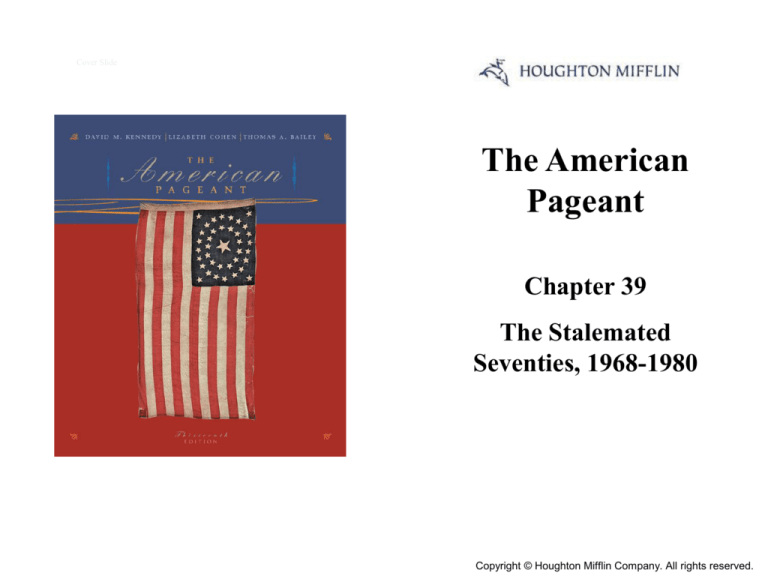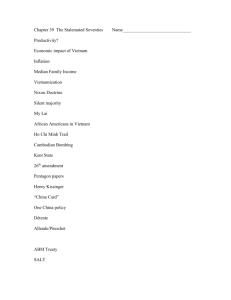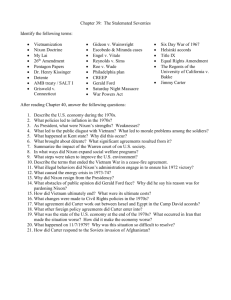
Cover Slide
The American
Pageant
Chapter 39
The Stalemated
Seventies, 1968-1980
Copyright © Houghton Mifflin Company. All rights reserved.
Camp David Accords
Camp David Accords
One of President Carter's greatest triumphs was the signing of the 1978 peace
accords between President Anwar Sadat of Egypt (left) and Prime Minister
Menachem Begin of Israel (right). The agreement followed days of personal
diplomacy by Carter at the Camp David presidential retreat. Both Sadat and Begin
received the Nobel Peace Prize for their efforts. (Jimmy Carter Presidential Library)
Copyright © Houghton Mifflin Company. All rights reserved.
Carter inauguration day
Carter inauguration day
On inauguration day, President Jimmy Carter (b. 1924) and his wife Rosalyn caught
the public's fancy by walking from the Capitol to the White House. Despite this
symbolic beginning, Carter became increasingly isolated both from the American
people and from Congress. (Jimmy Carter Presidential Library)
Copyright © Houghton Mifflin Company. All rights reserved.
College students after Kent state, May 1970
College students after Kent state, May 1970
While many older Americans supported the actions of the Ohio National Guard,
students across the country boycotted classes and forced hundreds of campuses to
shut down. Some continued to protest during graduation at the University of
Massachusetts. ((c) Bettmann/Corbis)
Copyright © Houghton Mifflin Company. All rights reserved.
Nixon before a stack of notebooks containing what he claimed to be the full transcripts of the Watergate tapes
Nixon before a stack of notebooks containing what he claimed to be the full transcripts of the Watergate tapes
How do historians know that President Richard M. Nixon was guilty of obstructing justice in the Watergate affair? What was the evidence--the "smoking gun"-that established his guilt? The so-called smoking gun referred to the tape recording of a White House conversation on June 23, 1972, that proved Nixon had
foreknowledge of the Watergate break-in, had instigated a cover-up, and had obstructed justice almost from the outset of the scandal. That day, Nixon ordered his
top aide to stop the Federal Bureau of Investigation's inquiry into the Watergate break-in. Tell the Central Intelligence Agency, Nixon thundered, to call the FBI,
claim that the break-in was a secret spy operation related to the 1961 Bay of Pigs invasion, and say "...that we wish for the country [that you] 'don't go further into
this case,' period." In 1973 and 1974 special prosecutors and congressional committees sued for release of this and other tapes, but Nixon resisted. On August 5,
1974, the Supreme Court ruled that executive privilege did not protect the subpoenaed tapes; the next day, the White House turned over a number of tapes,
including the smoking gun. Three days later, Richard Nixon resigned the presidency. Afterward, historians sued for access to the thousands of hours of unreleased
tapes; but for twenty-one years, Nixon and his family succeeded in keeping them private. In 1996, however, the Nixon estate, the National Archives and Records
Administration, and Stanley I. Kutler, a history professor at the University of Wisconsin, reached an agreement that called for some 3,700 hours of tapes to be
made public over the next several years. The first tapes released condemned President Nixon in his own words and shocked the American people. For example, on
May 13, 1971, Nixon was recorded growling demands for a commissioner of the Internal Revenue Service, who "is a ruthless son of a bitch, that he will do what he
is told, that every income tax return I want to see, I see. That he will go after our enemies and not go after our friends." A month later, Nixon ordered his aides to
arrange a break-in at the Brookings Institution, a liberal think tank in Washington: "Goddammit," he swore, "get in and get those files. Blow the safe and get it." In
January 2000 some of Watergate tapes became available to the public when the National Archives began to sell cassettes containing the 264 hours of so-called
"abuse of government power" recordings. (Nixon Presidential Materials Project)
Copyright © Houghton Mifflin Company. All rights reserved.
Map: Southeast Asia and the Vietnam War
Southeast Asia and the Vietnam War
To prevent communists from coming to power in Vietnam, Cambodia, and Laos in the 1960s, the United States intervened
massively in Southeast Asia. The interventions failed, and the remaining American troops made a hasty exit from Vietnam in
1975, when the victorious Vietcong and North Vietnamese took Saigon and renamed it Ho Chi Minh City.
Copyright © Houghton Mifflin Company. All rights reserved.
Video: Nixon’s Resignation Speech
Click on image to launch video.
Apple QuickTime® required for viewing
Nixon’s Resignation Speech
(1974. Archive Films.)
Copyright © Houghton Mifflin Company. All rights reserved.







